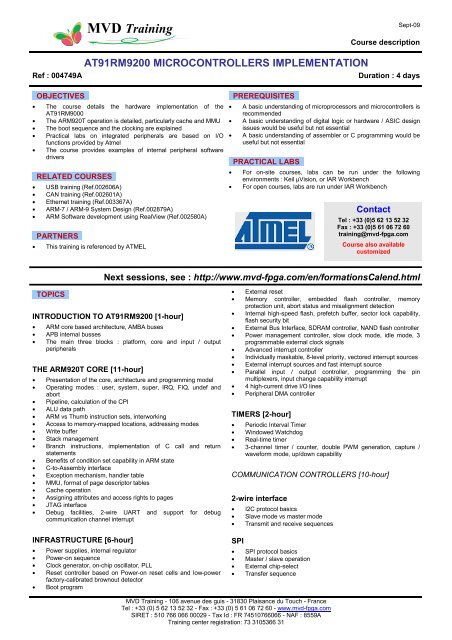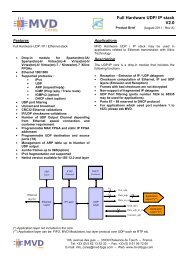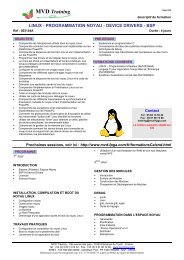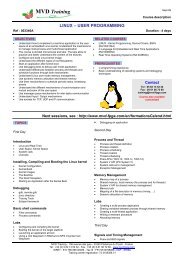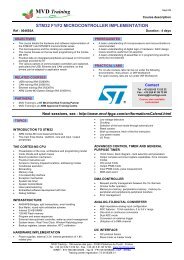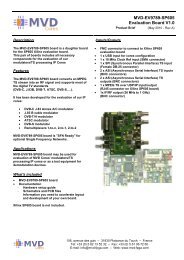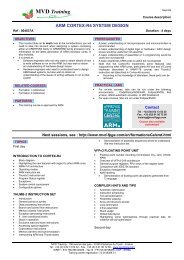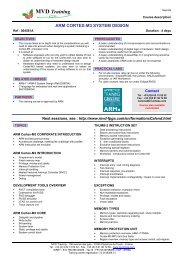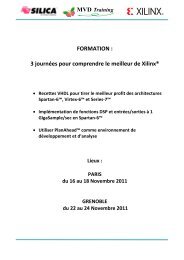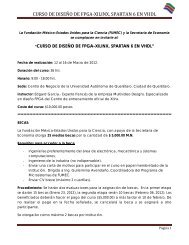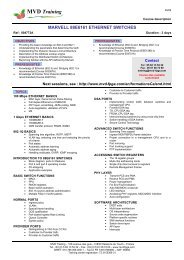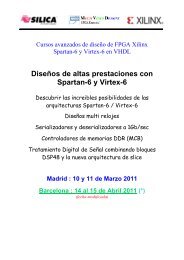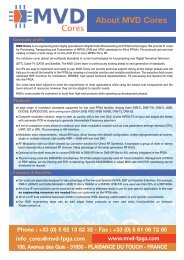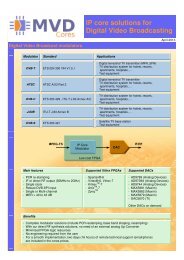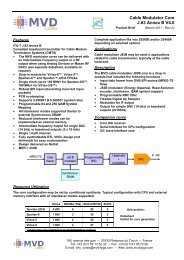Training AT91RM9200 MICROCONTROLLERS IMPLEMENTATION
Training AT91RM9200 MICROCONTROLLERS IMPLEMENTATION
Training AT91RM9200 MICROCONTROLLERS IMPLEMENTATION
Create successful ePaper yourself
Turn your PDF publications into a flip-book with our unique Google optimized e-Paper software.
MVD <strong>Training</strong><br />
Sept-09<br />
Course description<br />
<strong>AT91RM9200</strong> <strong>MICROCONTROLLERS</strong> <strong>IMPLEMENTATION</strong><br />
Ref : 004749A<br />
Duration : 4 days<br />
OBJECTIVES<br />
• The course details the hardware implementation of the<br />
AT91RM9000<br />
• The ARM920T operation is detailed, particularly cache and MMU<br />
• The boot sequence and the clocking are explained<br />
• Practical labs on integrated peripherals are based on I/O<br />
functions provided by Atmel<br />
• The course provides examples of internal peripheral software<br />
drivers<br />
RELATED COURSES<br />
• USB training (Ref.002606A)<br />
• CAN training (Ref.002601A)<br />
• Ethernet training (Ref.003367A)<br />
• ARM-7 / ARM-9 System Design (Ref.002879A)<br />
• ARM Software development using RealView (Ref.002580A)<br />
PARTNERS<br />
• This training is referenced by ATMEL<br />
PREREQUISITES<br />
• A basic understanding of microprocessors and microcontrollers is<br />
recommended<br />
• A basic understanding of digital logic or hardware / ASIC design<br />
issues would be useful but not essential<br />
• A basic understanding of assembler or C programming would be<br />
useful but not essential<br />
PRACTICAL LABS<br />
• For on-site courses, labs can be run under the following<br />
environments : Keil µVision, or IAR Workbench<br />
• For open courses, labs are run under IAR Workbench<br />
Contact<br />
Tel : +33 (0)5 62 13 52 32<br />
Fax : +33 (0)5 61 06 72 60<br />
training@mvd-fpga.com<br />
Course also available<br />
customized<br />
Next sessions, see : http://www.mvd-fpga.com/en/formationsCalend.html<br />
TOPICS<br />
INTRODUCTION TO <strong>AT91RM9200</strong> [1-hour]<br />
• ARM core based architecture, AMBA buses<br />
• APB internal busses<br />
• The main three blocks : platform, core and input / output<br />
peripherals<br />
THE ARM920T CORE [11-hour]<br />
• Presentation of the core, architecture and programming model<br />
• Operating modes : user, system, super, IRQ, FIQ, undef and<br />
abort<br />
• Pipeline, calculation of the CPI<br />
• ALU data path<br />
• ARM vs Thumb instruction sets, interworking<br />
• Access to memory-mapped locations, addressing modes<br />
• Write buffer<br />
• Stack management<br />
• Branch instructions, implementation of C call and return<br />
statements<br />
• Benefits of condition set capability in ARM state<br />
• C-to-Assembly interface<br />
• Exception mechanism, handler table<br />
• MMU, format of page descriptor tables<br />
• Cache operation<br />
• Assigning attributes and access rights to pages<br />
• JTAG interface<br />
• Debug facilities, 2-wire UART and support for debug<br />
communication channel interrupt<br />
INFRASTRUCTURE [6-hour]<br />
• Power supplies, internal regulator<br />
• Power-on sequence<br />
• Clock generator, on-chip oscillator, PLL<br />
• Reset controller based on Power-on reset cells and low-power<br />
factory-calibrated brownout detector<br />
• Boot program<br />
• External reset<br />
• Memory controller, embedded flash controller, memory<br />
protection unit, abort status and misalignment detection<br />
• Internal high-speed flash, prefetch buffer, sector lock capability,<br />
flash security bit<br />
• External Bus Interface, SDRAM controller, NAND flash controller<br />
• Power management controller, slow clock mode, idle mode, 3<br />
programmable external clock signals<br />
• Advanced interrupt controller<br />
• Individually maskable, 8-level priority, vectored interrupt sources<br />
• External interrupt sources and fast interrupt source<br />
• Parallel input / output controller, programming the pin<br />
multiplexers, input change capability interrupt<br />
• 4 high-current drive I/O lines<br />
• Peripheral DMA controller<br />
TIMERS [2-hour]<br />
• Periodic Interval Timer<br />
• Windowed Watchdog<br />
• Real-time timer<br />
• 3-channel timer / counter, double PWM generation, capture /<br />
waveform mode, up/down capability<br />
COMMUNICATION CONTROLLERS [10-hour]<br />
2-wire interface<br />
• I2C protocol basics<br />
• Slave mode vs master mode<br />
• Transmit and receive sequences<br />
SPI<br />
• SPI protocol basics<br />
• Master / slave operation<br />
• External chip-select<br />
• Transfer sequence<br />
MVD <strong>Training</strong> - 106 avenue des guis - 31830 Plaisance du Touch - France<br />
Tel : +33 (0) 5 62 13 52 32 - Fax : +33 (0) 5 61 06 72 60 - www.mvd-fpga.com<br />
SIRET : 510 766 066 00029 - Tax Id : FR 74510766066 - NAF : 8559A<br />
<strong>Training</strong> center registration: 73 3105366 31
MVD <strong>Training</strong><br />
USART<br />
• Individual baud rate generators<br />
• IrDA modulation / demodulation<br />
• Support for Smart Card<br />
• RS485 support<br />
• Flow control<br />
• Practical lab : Communication with a PC, using HyperTerminal<br />
Synchronous Serial Controller<br />
• Independent clock and frame sync signals for each receiver and<br />
transmitter<br />
• I2S analog interface support<br />
• Time Division Multiplexed support<br />
• High speed continuous data stream capabilities<br />
Ethernet MAC<br />
• Full duplex vs half duplex operation<br />
• Accessing PHY registers, auto-negotiation<br />
• Receive and Transmit buffer management, buffer descriptors<br />
• Incoming frame filtering<br />
• Error management<br />
Sept-09<br />
Course description<br />
• Practical lab : Communication with a PC, using Wireshark<br />
USB device<br />
• Full speed operation<br />
• Endpoint configuration<br />
USB host<br />
• Overview of the OHCI specification<br />
• Understanding how USB packets are prepared and scheduled<br />
for transmission, transfer descriptor<br />
• Clarifying the boundary between software and hardware<br />
Multimedia Card Interface (on demand)<br />
• MMC and SD card basics<br />
• Hardware interface<br />
• Command / response protocol<br />
• Read sequence<br />
• Write sequence<br />
• Related interrupts<br />
DOCUMENTATION<br />
<strong>Training</strong> manuals will be given to attendees during training in print.<br />
MVD <strong>Training</strong> - 106 avenue des guis - 31830 Plaisance du Touch - France<br />
Tel : +33 (0) 5 62 13 52 32 - Fax : +33 (0) 5 61 06 72 60 - www.mvd-fpga.com<br />
SIRET : 510 766 066 00029 - Tax Id : FR 74510766066 - NAF : 8559A<br />
<strong>Training</strong> center registration: 73 3105366 31


